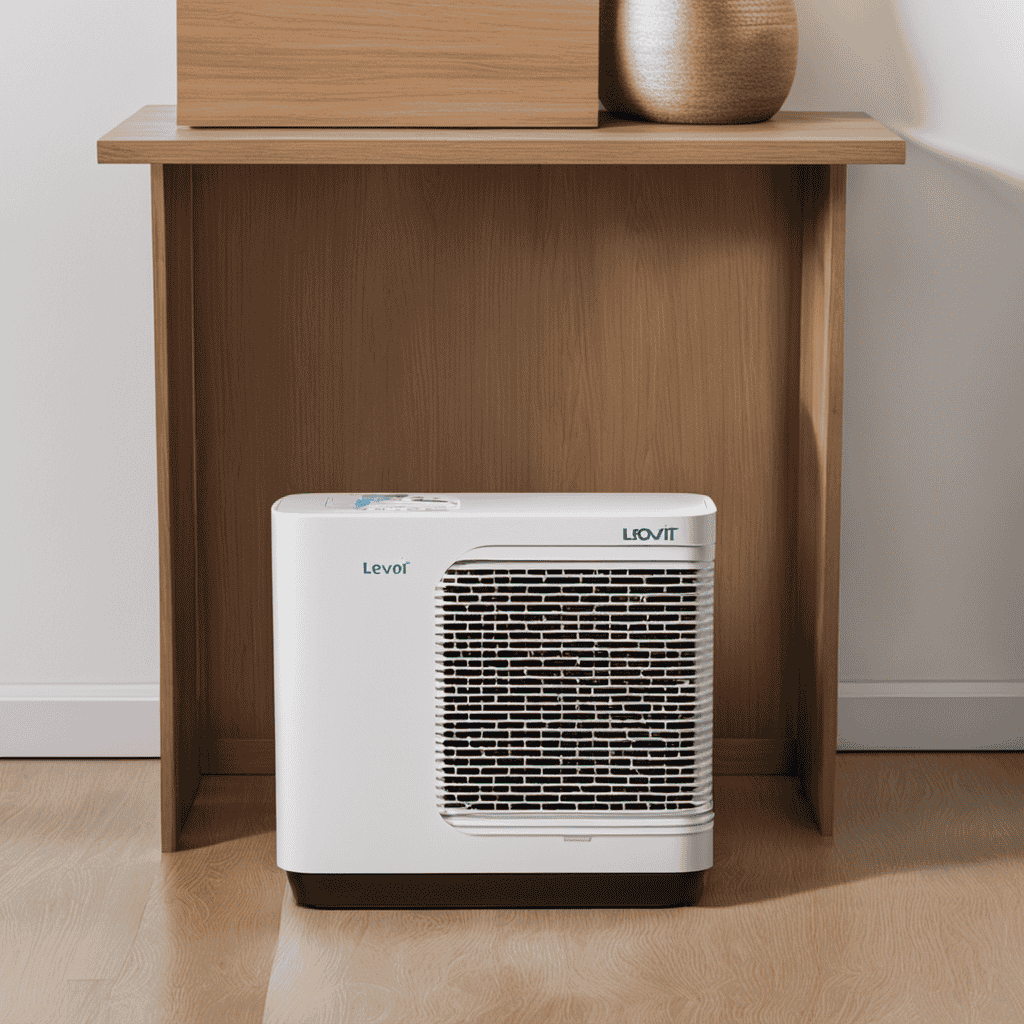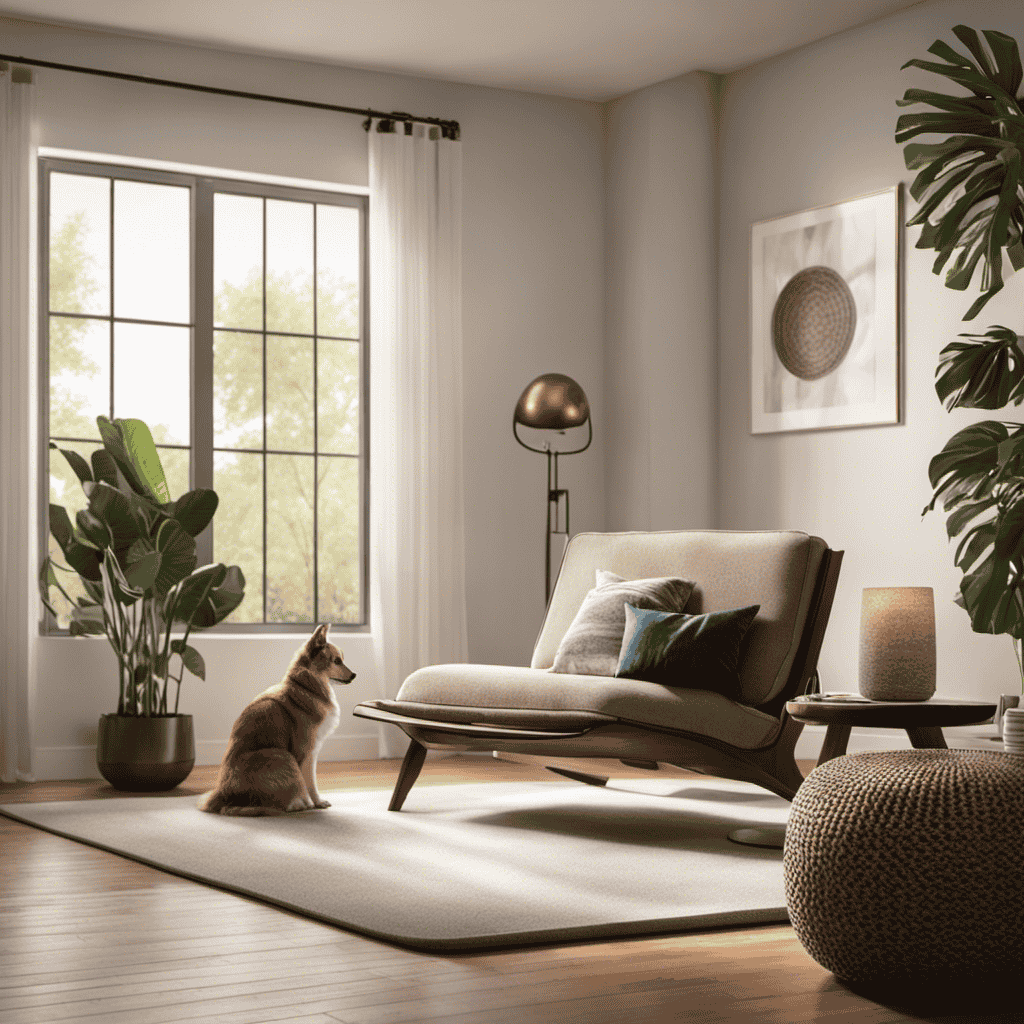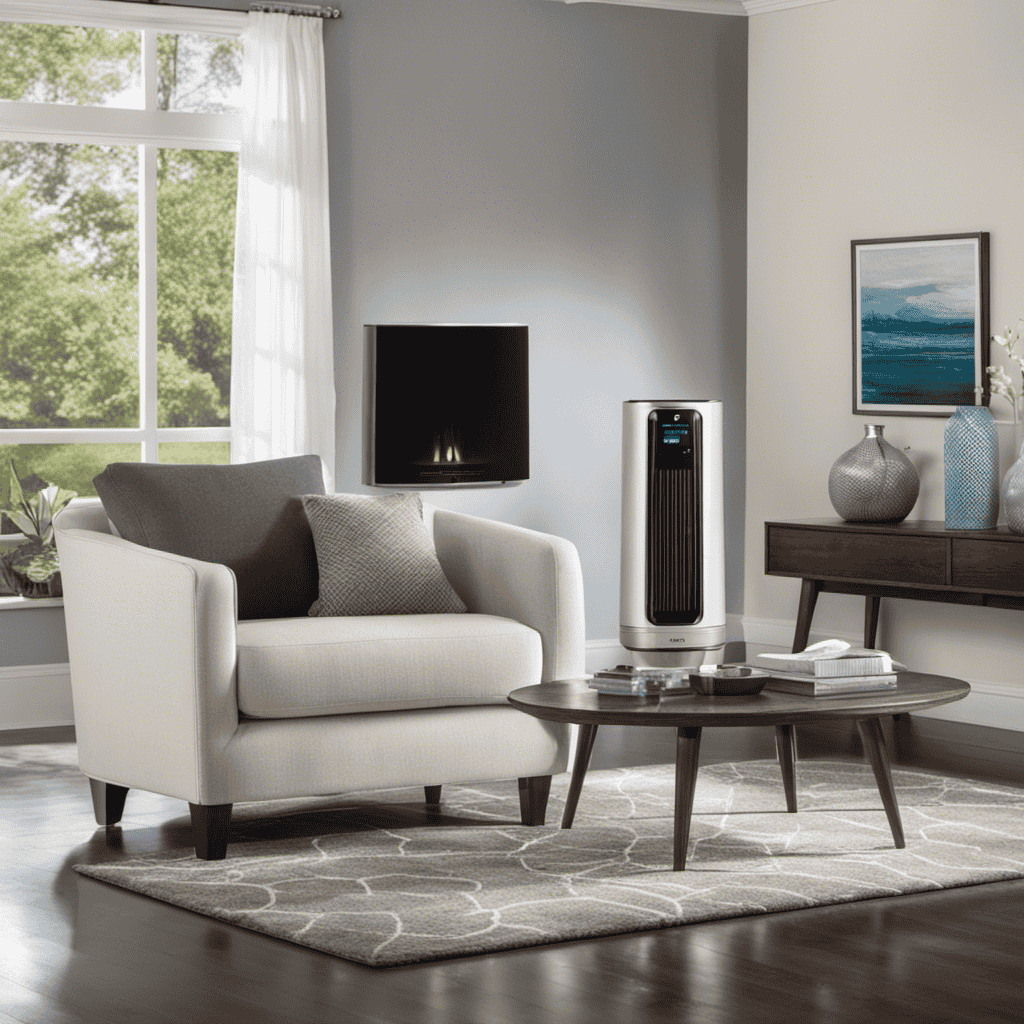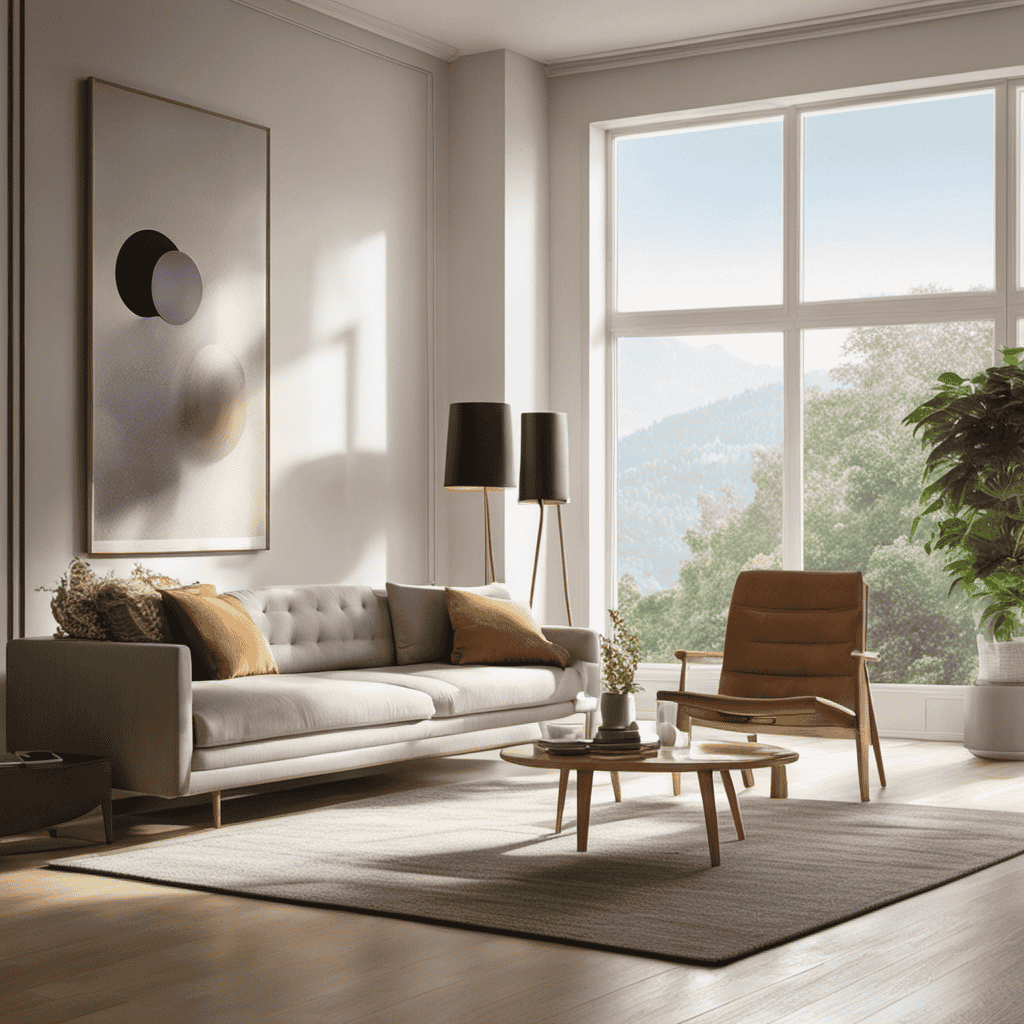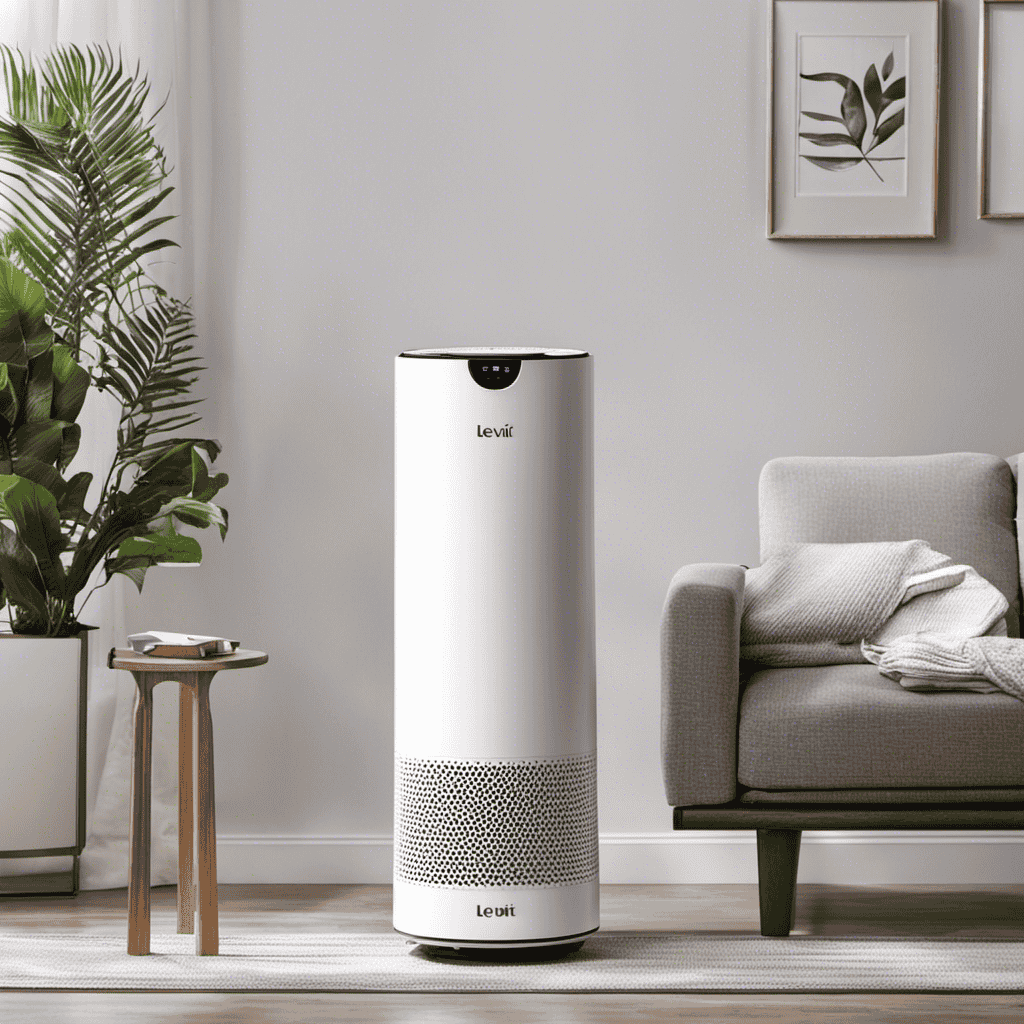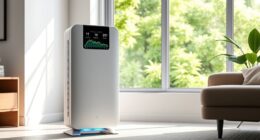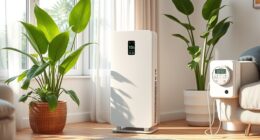As a owner of an air purifier, I have learned to understand the significance of correctly disposing of filters. They are essential in keeping an indoor environment healthy by capturing harmful particles.
In this article, I’ll guide you through the process of disposing of your Levoit air purifier filter in a responsible and eco-friendly manner. From understanding their lifespan to cleaning before disposal, I’ll provide step-by-step instructions and explore different options for disposal.
Let’s ensure our indoor air quality remains pristine while minimizing our environmental impact.
Key Takeaways
- Proper disposal of air purifier filters is important for reducing environmental pollution and preventing the release of harmful substances into the air, water, and soil.
- Understanding the lifespan of air purifier filters is crucial for maintaining their effectiveness and optimal performance.
- When removing and installing air purifier filters, it is important to follow a step-by-step guide and ensure proper disposal of the old filter.
- Cleaning the air purifier filter before disposal is necessary and can be done through vacuuming, rinsing, or using specialized cleaning solutions.
Why Proper Disposal of Air Purifier Filters Is Important
Properly disposing of your air purifier filters is important because it reduces environmental pollution and ensures the effectiveness of your purifier. When you think about the recycling benefits and the environmental impact of air purifier filters, it becomes clear why proper disposal is crucial.
These filters are made of materials that can be harmful to the environment if not disposed of correctly. By recycling the filters, you can help reduce the amount of waste that ends up in landfills and prevent the release of harmful substances into the air, water, and soil.
Additionally, proper disposal ensures that your purifier continues to work efficiently. Clogged or dirty filters can hinder the performance of your purifier, reducing its ability to remove pollutants from the air.
Understanding the lifespan of air purifier filters is essential to maintaining their effectiveness.
Understanding the Lifespan of Air Purifier Filters
Understanding the lifespan of air purifier filters can help you determine when it’s time to replace them. Proper lifespan management and filter maintenance are crucial for maintaining the effectiveness of air purifiers. Here are four key points to consider:
-
Filter Type: Different air purifiers use different types of filters, such as HEPA filters or activated carbon filters. Each filter type has a specific lifespan based on its design and intended usage.
-
Indoor Air Quality: The lifespan of air purifier filters can be influenced by the quality of the air being filtered. If you live in an area with high levels of pollutants or have pets or smokers in your home, the filters may need to be replaced more frequently.
-
Manufacturer Recommendations: Most air purifier manufacturers provide guidelines on when to replace filters. These recommendations are based on extensive testing and are designed to ensure optimal performance.
-
Filter Replacement Indicators: Many air purifiers have built-in filter replacement indicators that monitor the lifespan of the filters. These indicators use data such as airflow or filter usage to determine when it’s time for a replacement.
Step-by-Step Guide to Removing the Levoit Air Purifier Filter
When it comes to maintaining an air purifier, there are three key points that require careful attention: proper filter disposal, removing the old filter, and installing a new filter.
Ensuring proper filter disposal is crucial to prevent any potential contamination or environmental damage.
When removing the old filter, it is important to follow a step-by-step guide to ensure a smooth and efficient process.
Proper Filter Disposal
To dispose of your air purifier filter, you can simply follow the manufacturer’s instructions. However, it’s important to be aware of the disposing regulations and the environmental impact of your actions. Here are four key points to consider when disposing of your air purifier filter:
-
Check local regulations: Different regions have different regulations regarding the disposal of air purifier filters. Ensure you comply with these regulations to avoid any legal issues.
-
Separate the filter materials: Most air purifier filters are made up of different materials such as paper, plastic, and activated carbon. Separate these materials before disposing of them to facilitate recycling and proper waste management.
-
Recycle if possible: Look for recycling facilities in your area that accept air purifier filters. Recycling helps reduce the environmental impact by reusing the materials and preventing them from ending up in landfills.
-
Contact the manufacturer: Some manufacturers offer take-back programs for their filters. Reach out to them to inquire about proper disposal methods or any recycling initiatives they may have.
Removing the Old Filter
Before removing the old filter, make sure to turn off the power to your air purifier.
When it comes to cleaning techniques for air purifier filters, there are a few options available. You can vacuum the filter to remove dust and debris, or use compressed air to blow away any trapped particles.
For more thorough cleaning, you can wash the filter with mild soap and water, making sure to rinse it thoroughly and allow it to dry completely before reinstalling.
As for storage methods, it is recommended to keep the filter in a clean, dry place, away from direct sunlight and excessive heat. This will help to maintain its effectiveness and prolong its lifespan.
Now, let’s move on to the installation of the new filter.
Installation of New Filter
Now that you have the new filter, it’s time to carefully align it with the designated slot in your air purifier. This step is crucial for the proper functioning of your purifier. Here’s a step-by-step guide to installing a new filter:
- Turn off the air purifier and unplug it from the power source to ensure safety during installation.
- Open the front cover or access panel to reveal the filter compartment.
- Remove the old filter and dispose of it properly.
- Take the new filter and slide it into the designated slot, making sure it fits snugly.
- Close the front cover or access panel and plug the air purifier back in.
Troubleshooting common filter installation problems:
- If the filter doesn’t fit, double-check that you have the correct replacement filter for your specific air purifier model.
- If the filter is not aligning properly, gently adjust it until it fits securely.
Now that you have successfully installed the new filter, let’s move on to the next step: cleaning the air purifier filter before disposal.
How to Clean the Air Purifier Filter Before Disposal
When it comes to proper disposal methods and cleaning techniques for air purifier filters, it is important to follow specific guidelines to ensure safety and efficiency.
Proper disposal methods involve understanding the type of filter and checking local regulations for recycling or disposal options.
Cleaning techniques for filters vary depending on the type of filter, but common methods include vacuuming, rinsing, or using a specialized cleaning solution.
Proper Disposal Methods
To properly dispose of your Levoit air purifier filter, you can check with your local waste management facility for specific instructions. Proper disposal methods are essential to ensure the safe handling of the filter and minimize environmental impact. Here are four benefits of proper disposal:
-
Environmental Protection: Disposing of the filter correctly prevents harmful pollutants, such as dust and allergens, from entering the ecosystem.
-
Health and Safety: Proper disposal reduces the risk of exposure to contaminants, ensuring a healthier living environment.
-
Compliance with Regulations: Following proper disposal methods ensures compliance with local regulations and helps maintain a clean and sustainable community.
-
Resource Conservation: By disposing of the filter responsibly, valuable resources used in its production, such as plastics and metals, can be recovered and reused.
Cleaning Techniques for Filter?
To effectively clean your air purifier filter, you should gently vacuum or rinse it with water to remove any accumulated dirt and debris. Regular cleaning ensures optimal performance and prolongs the lifespan of your filter. Here are some maintenance tips and cleaning techniques for your air purifier filter:
| Cleaning Technique | Frequency | Benefits |
|---|---|---|
| Vacuuming | Every 1-2 weeks | Removes surface dust and pet hair |
| Rinsing | Every 2-3 months | Deep cleans the filter and removes stubborn particles |
| Air Drying | After rinsing | Prevents mold and mildew growth |
Different Options for Disposing of Air Purifier Filters
There are various options for disposing of air purifier filters, such as recycling or contacting the manufacturer for guidance. When it comes to recycling options, there are a few routes you can take:
-
Local Recycling Centers: Check if your local recycling center accepts air purifier filters. They may have specific instructions on how to prepare and drop off the filters for recycling.
-
Manufacturer Recycling Programs: Some air purifier manufacturers have their own recycling programs. Reach out to the manufacturer of your air purifier to see if they offer such a program and how you can participate.
-
Donating Filters: Consider donating your used air purifier filters to organizations or individuals in need. This can help extend the lifespan of the filters and benefit others who may not have access to clean air.
-
Online Recycling Programs: Look for online recycling programs that specialize in recycling air purifier filters. These programs often provide detailed instructions on how to properly package and ship the filters for recycling.
Recycling Air Purifier Filters: What You Need to Know
When it comes to the proper disposal of air purifier filters, it is essential to understand the various methods available.
This discussion will focus on the most effective ways to dispose of these filters, ensuring minimal environmental impact.
Additionally, we will explore the recycling options available for those who want to contribute to a more sustainable future.
Proper Disposal Methods
You should follow proper disposal methods for your Levoit air purifier filter. Proper disposal is important not only for the environment but also for ensuring the effectiveness of your air purifier. Here are four key points to consider:
-
Clean the filter regularly: Regular cleaning helps extend the lifespan of your filter and maintain its efficiency. Follow the manufacturer’s instructions for cleaning methods to ensure proper maintenance.
-
Check for recycling options: Many air purifier filters can be recycled. Check with your local recycling facilities or contact the manufacturer to inquire about recycling programs for your specific filter model.
-
Dispose of non-recyclable filters responsibly: If recycling is not an option, it is important to dispose of the filter properly. Check local regulations for guidelines on how to dispose of non-recyclable filters. This helps minimize the environmental impact.
-
Consider filter replacement: When disposing of a filter, it may be time to consider purchasing a replacement. Upgrading to a new filter can improve air quality and ensure optimal performance.
Recycling Options Available
If recycling is an option, you can check with local facilities or the manufacturer to inquire about recycling programs for your specific model.
Recycling options for air purifier filters are becoming increasingly important as people become more conscious of the environmental impact of their actions. Fortunately, many manufacturers and local facilities offer recycling programs for air purifier filters.
These programs ensure that the filters are properly disposed of and recycled, reducing the amount of waste that ends up in landfills. Recycling air purifier filters is not only beneficial for the environment but also for the health of individuals.
Donating Used Air Purifier Filters: Is It Possible
Donating used air purifier filters may be possible, depending on the organization’s guidelines. While recycling is the preferred method of disposal for air purifier filters, some organizations may accept used filters for donation. Here are four key points to consider in regards to donating options and the environmental impact:
-
Organizational Guidelines: Before donating, it is crucial to check the guidelines of the organization to ensure they accept used air purifier filters. Not all organizations may have the facilities or resources to handle and reuse these filters.
-
Condition of the Filters: Filters that are still in good condition and have not exceeded their recommended lifespan are more likely to be accepted for donation. Damaged or expired filters may not be suitable for reuse.
-
Reusable Filters: Donating used air purifier filters can help extend their lifespan and reduce waste. Reusable filters can be cleaned, sanitized, and reinstalled in other compatible air purifiers, promoting sustainability.
-
Environmental Impact: By donating air purifier filters, you can contribute to reducing landfill waste. Instead of disposing of used filters, they can be repurposed and used by others, minimizing the environmental impact associated with manufacturing new filters.
How to Safely Dispose of Air Purifier Filters in Landfills
When disposing of used filters in landfills, it is important to follow proper safety guidelines. Improper disposal of air purifier filters can have negative environmental impacts due to the chemicals and pollutants they may contain.
To ensure safe disposal, it is recommended to clean the filter before disposing of it. Cleaning techniques such as vacuuming or rinsing can remove dust and debris from the filter surface. However, it is essential to check the manufacturer’s instructions for specific cleaning guidelines.
Additionally, eco-friendly alternatives for disposing of air purifier filters should be considered. Transitioning to eco-friendly alternatives can help reduce waste and promote sustainability.
In the subsequent section, we will explore some of these alternatives and their benefits.
Eco-Friendly Alternatives for Disposing of Air Purifier Filters
To be more environmentally friendly in disposing of your air purifier filters, consider exploring eco-friendly alternatives that promote sustainability.
Here are four sustainable options to consider:
-
Filter recycling programs: Many manufacturers offer recycling programs for their air purifier filters. These programs ensure that the filters are properly recycled and the materials are reused, reducing waste and conserving resources.
-
Composting: If your air purifier filters are made of biodegradable materials, such as activated carbon or organic fibers, you can consider composting them. This allows the filters to break down naturally and return valuable nutrients to the soil.
-
Upcycling: Get creative and find ways to upcycle your used air purifier filters. You can repurpose them into DIY crafts, such as coasters or plant pot liners, giving them a new life instead of sending them to the landfill.
-
Donate to research institutions: Some research institutions may accept used air purifier filters for testing and analysis purposes. By donating your filters, you contribute to scientific advancements and support sustainability efforts.
By exploring these eco-friendly alternatives, we can reduce the environmental impact of air purifier filter disposal and promote a more sustainable future.
Now, let’s discuss the best practices for storing used air purifier filters.
Best Practices for Storing Used Air Purifier Filters
To properly store your used air purifier filters, consider placing them in a sealed bag or container to prevent any dust or pollutants from escaping. This simple step can help maintain the effectiveness of the filters and ensure their longevity.
Proper storage is crucial for filter maintenance, as it helps to preserve their ability to remove contaminants from the air. When storing the filters, make sure to keep them in a cool and dry place, away from direct sunlight or excessive heat. Additionally, avoid storing them near any chemicals or strong odors that could potentially contaminate the filters.
Maintaining a Healthy Indoor Air Quality Without Air Purifier Filters
If you want to maintain a healthy indoor air quality without using air purifier filters, consider implementing natural methods such as opening windows, using houseplants, and keeping your home clean and well-ventilated.
These alternative options can effectively reduce pollutants in your living space without the need for filters.
Here are four cleaning techniques and alternative options to help you maintain a healthy indoor environment:
-
Opening windows: Allowing fresh air to circulate can help remove indoor pollutants and improve ventilation.
-
Using houseplants: Certain plants, like spider plants and peace lilies, can naturally filter and purify the air by absorbing harmful chemicals.
-
Regular cleaning: Dusting, vacuuming, and mopping can remove dust, pet dander, and other allergens from your home.
-
Proper ventilation: Ensuring that your home has adequate ventilation, such as exhaust fans in bathrooms and kitchens, can help remove pollutants and maintain a healthy indoor air quality.
Frequently Asked Questions
Can I Reuse or Recycle the Levoit Air Purifier Filter?
I can’t reuse the Levoit air purifier filter, but it can be recycled. To properly dispose of it, check with local recycling centers or waste management facilities for specific recycling options available in your area.
Are There Any Specific Regulations or Guidelines for Disposing of Air Purifier Filters?
There are disposal regulations and proper disposal methods for air purifier filters. It is important to follow these guidelines to ensure the safe and environmentally friendly disposal of the filters.
What Are the Potential Environmental Impacts of Improperly Disposing of Air Purifier Filters?
Improperly disposing of air purifier filters can have potential health risks and negative environmental impacts. It is important to follow proper disposal methods to minimize these risks and protect the environment.
Can I Donate My Used Levoit Air Purifier Filter to Any Organizations or Charities?
I can’t donate my used Levoit air purifier filter as it’s not accepted by organizations or charities. However, there are alternative disposal methods like recycling or contacting the manufacturer for guidance.
Is There a Specific Way to Clean the Levoit Air Purifier Filter Before Disposal to Ensure It Is Properly Sanitized?
To properly sanitize the Levoit air purifier filter before disposal, follow the manufacturer’s cleaning methods. This ensures thorough sanitization and extends the filter’s lifespan. It’s important to maintain a clean and healthy indoor environment.
Conclusion
In conclusion, the proper disposal of air purifier filters is crucial for maintaining healthy indoor air quality. Understanding the lifespan of these filters and following a step-by-step guide for their removal and cleaning is important.
When it comes to disposing of the filters, there are various options available. This includes landfill disposal as well as eco-friendly alternatives.
By storing used filters properly, we can ensure their longevity and effectiveness. It’s important to remember that maintaining a clean and purified environment is key, even without air purifier filters.
So let’s take charge and breathe in the freshest air possible!
